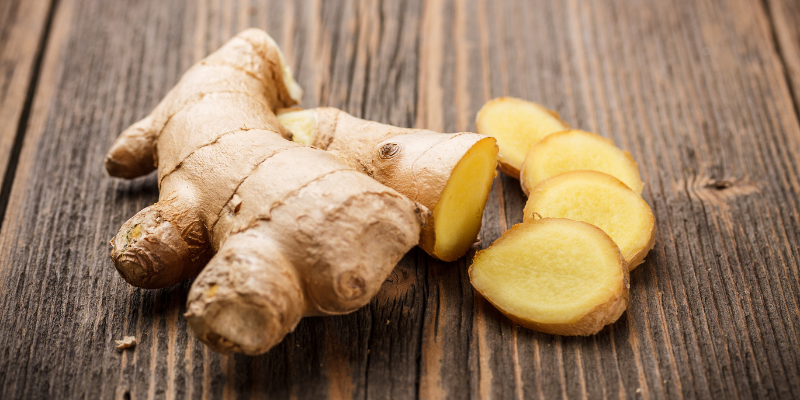
Introduction
Ginger, an extraordinary spice widely revered in global culinary traditions, boasts tantalizing flavors and irresistible aromas that elevate dishes to new levels. Although often referred to as a root vegetable, ginger technically doesn’t fall under that classification. In this comprehensive article, we will find the answer of this question: is ginger a vegetable? We will explore its essence, classification, nutritional profile, and health benefits and address any frequently asked questions regarding this captivating ingredient.
What Is Ginger?
Ginger, scientifically known as Zingiber officinale, hails from Southeast Asia and belongs to the Zingiberaceae family; other noteworthy spices in this family include turmeric and cardamom. Rhizomes–underground stems found within ginger plants–play an integral role both culinary and medicinally.
Nutritional Profile of Ginger
Ginger provides many essential nutrients while being low in calories. Let’s take a closer look at its nutrition profile of 100 grams of fresh ginger:
- Calories: 80
- Carbohydrates: 18 grams
- Protein: 2 grams
- Fat: 0.8 grams
- Fiber: 2 grams
- Vitamin C: 8 milligrams
- Potassium: 415 milligrams
Ginger’s nutritional profile is further enriched by bioactive compounds, paving the way for potential health benefits.
Health Benefits of Ginger
Ginger’s historical usage in traditional medicine finds validation in scientific research, highlighting its remarkable health-promoting properties. Let’s explore a few of the potential benefits ginger offers:
Digestive Health
Ginger has long been revered for its ability to assuage digestive ailments like nausea, vomiting, and indigestion. Its consumption can contribute to maintaining a healthy digestive system while alleviating gastrointestinal discomfort.
Anti-Inflammatory Properties
The presence of bioactive compounds, particularly gingerol, equips ginger with potent anti-inflammatory effects. These properties render ginger a potential remedy for conditions characterized by inflammation, such as osteoarthritis or rheumatoid arthritis.
Immune System Support
Ginger harbors antioxidants that fortify the immune system, shielding it from oxidative stress. Regularly including ginger in your diet can bolster overall immune system health.
How to Incorporate Ginger Into Your Diet
Unleashing ginger’s tantalizing flavor and potential health benefits into your culinary escapades is easier than you might think. Here are a few delectable suggestions:
- Add freshly grated ginger to enhance the flavor of stir-fries, soups, or curries.
- Prepare a refreshing cup of ginger tea by steeping sliced ginger in hot water.
- Infuse marinades or dressings with ginger for a tangy and refreshing kick.
- Indulge in ginger-infused beverages like ginger ale or invigorating ginger lemonade.
Precautions and Potential Side Effects
While ginger is generally safe for most individuals when consumed in moderation, a few precautions warrant attention:
- Some individuals may experience mild digestive discomfort or heartburn after consuming ginger.
- Certain medications may interact with ginger, necessitating consultation with a healthcare professional if you take any medications.
- Pregnant women should exercise caution and consult their healthcare provider before consuming ginger supplements or significant amounts of ginger.
Additional Ways to Enjoy Ginger
Aside from incorporating ginger into your cooking, there are other creative ways to enjoy its unique flavor and reap its benefits:
Ginger Supplements
If you find it challenging to consume ginger in its raw or cooked form, ginger supplements are a convenient alternative. These supplements typically come in capsules or tablets, providing a concentrated dose of ginger extract. However, consulting with a healthcare professional before starting any new supplements is essential.
Ginger in Baked Goods
Get creative in the kitchen by adding ginger to your baked goods. Gingerbread cookies, ginger scones, or ginger-infused cakes can add a delightful twist to your usual treats. Experiment with different recipes and discover the perfect balance of ginger flavor for your taste buds.
Ginger Smoothies
Revitalize your morning routine by adding a kick of ginger to your smoothies. Blend your favorite fruits, a handful of spinach or kale, a squeeze of lemon juice, and a slice of fresh ginger for a refreshing and nutritious beverage. Ginger’s unique taste pairs well with citrus fruits like oranges or pineapples.
Ginger Salad Dressings
Create zesty and invigorating salad dressings with the addition of ginger. Combine grated ginger, olive oil, lemon juice, honey, and a dash of soy sauce for a tangy and aromatic dressing. Drizzle it over your salads or use it as a marinade for grilled vegetables or tofu.
Ginger in Traditional Medicine
Ginger has long been an integral component of traditional medicine in various cultures worldwide, from China and Japan to Vietnam and South Korea. While modern scientific research continually explores its medicinal uses, it should be remembered that herbal remedies cannot replace professional medical advice or prescribed treatments.
Ginger: A Culinary and Health-Boosting Marvel
Ginger is an outstanding spice beyond being classified as a root or vegetable. Thanks to its distinctive flavor, tantalizing aroma, and potential health benefits – ginger has quickly become one of the world’s favorite kitchen ingredients. From digestive health benefits such as reduced inflammation to supporting the immune system – ginger offers many advantages that could improve everyday living if used responsibly. However, as with any diet modification recommendation, it’s wise to consult a healthcare professional beforehand to ensure personalized advice and optimal safety.
Unleash the magic of ginger as both a culinary masterpiece and an essential health supplement. Add this versatile spice to your cooking repertoire and discover its many delicious flavors and health-boosting properties – it may take your culinary creations and wellness efforts to new heights! Unlock its potential.
Frequently Asked Questions (FAQs)
Q1: Is ginger a vegetable or a spice?
A: Ginger, although often mistaken for a vegetable, is a rhizome that serves as a spice in various culinary preparations.
Q2: Can ginger help with motion sickness?
A: Yes, ginger has demonstrated its efficacy in alleviating symptoms of motion sickness, including nausea and vomiting.
Q3: Can ginger be used for pain relief?
A: Ginger’s potential anti-inflammatory properties render it a promising option for relieving specific types of pain, such as muscle soreness or menstrual cramps.
Q4: Can ginger be consumed during pregnancy?
A: While ginger is generally considered safe during pregnancy, it is advisable to consult a healthcare professional before consuming large amounts of ginger supplements.
Q5: Is it possible to be allergic to ginger?
A: Although rare, some individuals may exhibit allergic reactions to ginger. Seek immediate medical attention if you experience rash, itching, or difficulty breathing after consuming ginger.
Conclusion
In summary, while ginger is often portrayed as a root and utilized as a spice in culinary ventures, it does not fall into the vegetable category. Ginger’s true nature as a rhizome unveils a distinctive flavor and captivating aroma that enriches many dishes. Beyond its culinary allure, ginger showcases potential health benefits, including promoting digestive health, alleviating inflammation, and support for the immune system. However, it is crucial to exercise prudence, especially if you have underlying medical conditions or are taking medications. To receive personalized advice regarding any dietary considerations, it is always advisable to consult with a healthcare professional. Embrace the wonders of ginger and embark on a flavorful and health-enhancing journey!
Read more at Articleritz



